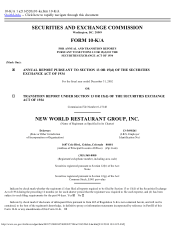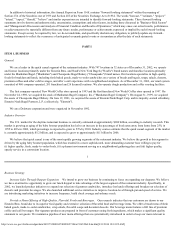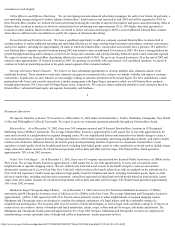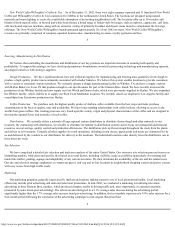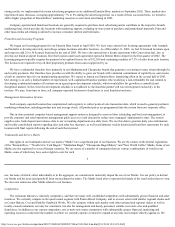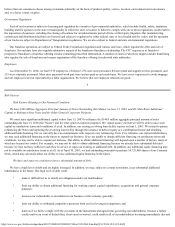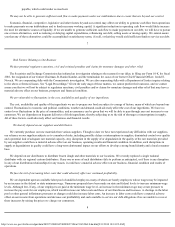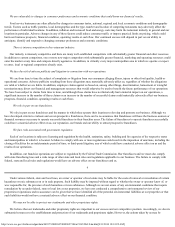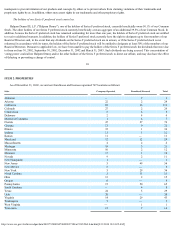Einstein Bros 2002 Annual Report Download - page 8
Download and view the complete annual report
Please find page 8 of the 2002 Einstein Bros annual report below. You can navigate through the pages in the report by either clicking on the pages listed below, or by using the keyword search tool below to find specific information within the annual report.
http://www.sec.gov/Archives/edgar/data/949373/000104746903027186/a2116520z10-ka.htm[9/11/2014 10:14:22 AM]
payable, which could render us insolvent.
We may not be able to generate sufficient cash flow to make payments under our indebtedness due to events that are beyond our control.
Economic, financial, competitive, legislative and other factors beyond our control may affect our ability to generate cash flow from operations
to make payments on our indebtedness and to fund necessary working capital. A significant reduction in operating cash flow would likely increase
the need for alternative sources of liquidity. If we are unable to generate sufficient cash flow to make payments on our debt, we will have to pursue
one or more alternatives, such as reducing or delaying capital expenditures, refinancing our debt, selling assets or raising equity. We cannot assure
you that any of these alternatives could be accomplished on satisfactory terms, if at all, or that they would yield sufficient funds to service our debt.
7
Risk Factors Relating to Our Business
We face potential regulatory sanctions, civil and criminal penalties and claims for monetary damages and other relief.
The Securities and Exchange Commission has initiated an investigation relating to the reasons for our delay in filing our Form 10-K for fiscal
2001, the resignation of our former Chairman, R. Ramin Kamfar, and the termination for cause of our former Chief Financial Officer, Jerold E.
Novack. We are cooperating fully with the Commission's investigation. We are also cooperating fully with a Department of Justice inquiry relating
to the above-referenced issues. See "Legal Proceedings." Given the early stage of these matters, we cannot predict their outcome, and we cannot
assure you that we will not be subject to regulatory sanctions, civil penalties and/or claims for monetary damages and other relief that may have a
material adverse effect on our business, prospects and financial condition.
We are vulnerable to fluctuations in the cost, availability and quality of our ingredients.
The cost, availability and quality of the ingredients we use to prepare our food are subject to a range of factors, many of which are beyond our
control. Fluctuations in economic and political conditions, weather and demand could adversely affect the cost of our ingredients. We have no
control over fluctuations in the price of commodities, and no assurance can be given that we will be able to pass through any cost increases to our
customers. We are dependent on frequent deliveries of fresh ingredients, thereby subjecting us to the risk of shortages or interruptions in supply.
All of these factors could adversely affect our business and financial results.
We heavily depend on our suppliers and distributors.
We currently purchase our raw materials from various suppliers. Though to date we have not experienced any difficulties with our suppliers,
our reliance on our suppliers subjects us to a number of risks, including possible delays or interruptions in supplies, diminished control over quality
and a potential lack of adequate raw material capacity. Any disruption in the supply of or degradation in the quality of the raw materials provided
by our suppliers could have a material adverse effect on our business, operating results and financial condition. In addition, such disruptions in
supply or degradations in quality could have a long-term detrimental impact on our efforts to develop a strong brand identity and a loyal consumer
base.
We depend on our distributors to distribute frozen dough and other materials to our locations. We recently replaced a single national
distributor with six regional custom distributors. If any one or more of such distributors fails to perform as anticipated, or if there is any disruption
in any of our distribution relationships for any reason, it could have a material adverse effect on our business, financial condition and results of
operations.
We face the risk of increasing labor costs that could adversely affect our continued profitability.
We are dependent upon an available labor pool of unskilled employees, many of whom are hourly employees whose wages may be impacted
by an increase in the federal or state minimum wage. Numerous proposals have been made on state and federal levels to increase minimum wage
levels. Although few, if any, of our employees are paid at the minimum wage level, an increase in the minimum wage may create pressure to
increase the pay scale for our employees, which would increase our labor costs and those of our franchisees and licensees. A shortage in the labor
pool or other general inflationary pressures or changes could also increase labor costs. An increase in labor costs could have a material adverse
effect on our income from operations and decrease our profitability and cash available to service our debt obligations if we are unable to recover
these increases by raising the prices we charge our consumers.
8

